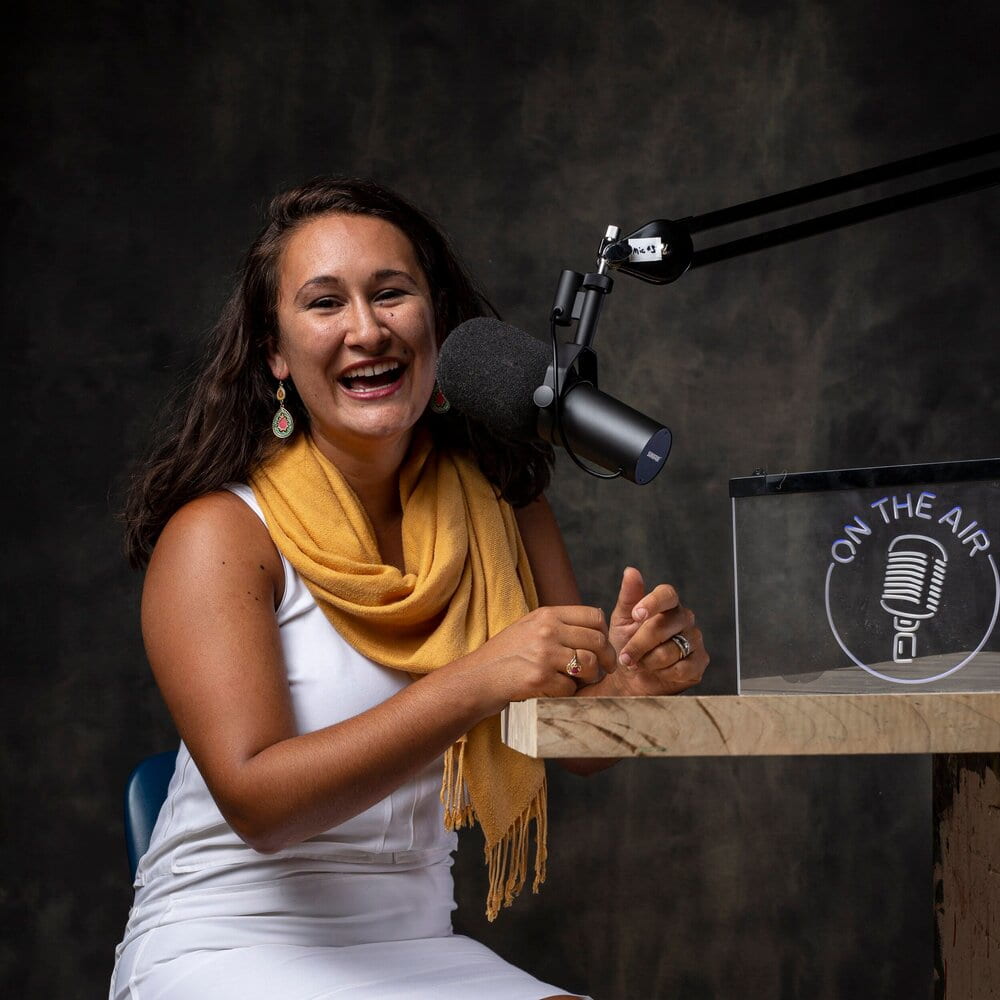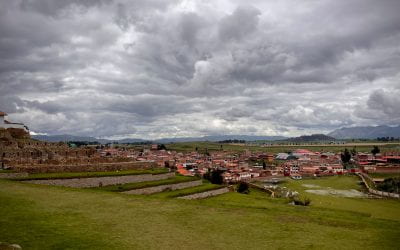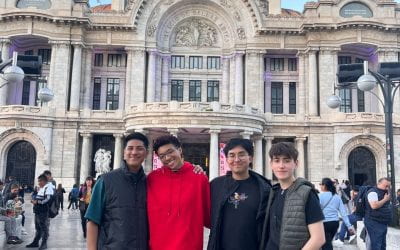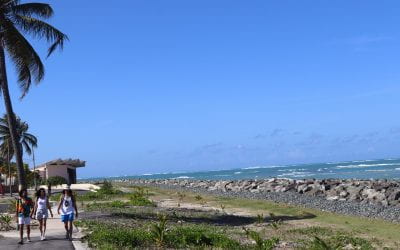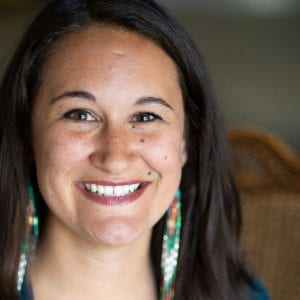
About the Author
Rebecca Mendoza Nunziato, a first-year master’s student at Harvard Divinity School, was born and raised in Colorado and lives in Cambridge, Massachusetts. Rebecca is passionate about decolonial spirituality, particularly through Latinx exploration and reclamation of earth-based ancient practices. She seeks to honor indigenous wisdom through scholarship in Mesoamerican culture and religion. Podcast: https://decolonizeeverything.buzzsprout.com/ Personal website: rebeccamendozanunziato.com Instagram: https://www.instagram.com/becca_nunzi/
Decolonize Everything
Podcasting as Sacred Listening and Collective Liberation
I exhale slowly, prepare to speak, and then press record. “Hello and welcome to Decolonize Everything! My name is Rebecca Mendoza Nunziato and I’m your host, conversation partner and convener of our virtual sacred circle.” This is the opening line of an independent podcast I launched during the Covid-19 shutdown this past summer.
Each new podcast episode makes a promise to my listener that I intend to keep. When I repeat these two dozen words in the show’s introduction, I declare my intention to hold a space for decolonial dialogue and sacred relationships. Decolonization itself is a type of intention and promise. While I am reluctant to define the term, here’s my best attempt: decolonization is an active and ongoing process of dismantling white supremacy and all colonial institutions and ideologies that preserve and perpetuate domination over Indigenous and colonized peoples. Decolonization is resistance to the deeply seeded consciousness and practices of colonization past and present and the pursuit of liberation for land, humans and the more-than-human realm. While I focus my own work in the Americas, decolonization is an ethic that goes beyond borders while remaining in relationship with the specific concrete realities at hand.
This show is part of my own journey and I invite others to join me as conversation partners and listeners because decolonization is inherently a collective pursuit. My podcast is a promise of process, not product. Rather than delivering an over-produced interview with a famous author and a bow on top, I seek to decolonize the methodology and myself in the process. I produce the show as a spiritual practice, and I seek to build an audio experience that gives marginalized wisdom a platform.
Before I dig further into these intentions for the show, let’s rewind a bit.
I can’t say I remember the first time I heard the word “decolonize.” I am almost certain it would have been in my readings during a college course at the University of Oregon that changed the trajectory of my life. The course was PHIL 342: Introduction to Latin American Philosophy. I enrolled because the description was intriguing, not to mention the pragmatic bonus that I would receive course credit for both of my majors—political science and Spanish. It was also the academic term right before I traveled to Buenos Aires, Argentina to research social movements and human rights. My mind was on fire and I had begun to experience liberation through education.
Professor Alejandro Arturo Vallega Arredondo taught me that knowledge, being and power did not solely belong to and come from Europe, the United States and whiteness. Despite spending a decade in Spanish classes attempting to understand my own heritage, language and culture, I did not truly see myself, a Chicana from Colorado, in the story. I did not see myself or my people as architects of meaning: we were artisans not artists, our handiwork was craft, not fine art, and our knowledge was in mythology but certainly not philosophy. Philosophy was reserved for the ancient Greeks and modern Germans. In my 14 years of public-school education, Indigenous, sub-altern and periphery people had been erased from the curriculum. I had never learned about colonization or explored the role of colonization in modern times. Though my elementary school was named Namaqua (a word meaning “by or near the water” likely from the Cherokee peoples), the only acknowledgement of the land or the town’s history was in celebration of Manifest Destiny. Despite the fruitful (and unjust) labor of Mexicans in the fields surrounding my hometown, there was hatred of all “others”—overt and covert. Colonization was simply the unquestioned reality, the Wizard of Oz curtain that nobody in my world had dared to disturb.
In spring 2013, in a small classroom on the edge of the campus, Professor Vallega drew circles and arrows on the blackboard. He described to us Immanuel Wallerstein’s World-Systems Theory in straightforward terms, outlining the flow of labor and wealth. He told us the stories that were absent from my other courses. Professor Vallega introduced me to Anibal Quijano, Walter Mignolo, Maria Lugones, Enrique Dussel, Paulo Freire and countless others who have become my companions and guides through their writings. I didn’t realize in the moment how my consciousness was pivoting in this very classroom. In the following months and years these theories would infuse the entire way that I saw the world. I started to see colonization more clearly, charting historical moments, mapping legacies and ultimately looking inward to notice my own internalized coloniality. By that, I mean the ways that I have colonized my own self! I did not realize the degree to which I had enacted these violent Euro-centric standards onto myself in nearly every area of my life: beauty, food, religion, just to name a few.
After graduating college, I spent a few years working for non-profit community development organizations. I began to wake up to the reality that seeing and calling out colonization wasn’t enough, I needed to engage colonization with an intention to dismantle it. I began to search for teachers who were embodying resistance. I read books and engaged online with decolonial practitioners to bring their wisdom into my home and my consciousness. But I also found LaQueta McCauley.
LaQueta and I were collaborators in one of Denver’s public housing communities where we coordinated gatherings for kids and picnics for adults. And as I got to know LaQueta, I realized that she too embodied resistance. She too was a producer of knowledge, a woman with so much to offer alongside the published books and articles I had learned to appreciate. And alongside LaQueta, was Paul, who has been unhoused for the majority of his adult life, addicted to heroin, and is an incredibly wise, loving teacher. I came to see that LaQueta and Paul aren’t the exception (though they are exceptional humans). I fell in love with lived mutuality in one of the most abandoned areas of the city. I realized that wisdom is abundant.
This brings us back to the summer of Covid-19 and the launch of my podcast, Decolonize Everything. I launched just as I began to pack up my belongings for a move from Denver, Colorado to Cambridge, Massachusetts. I was, and still am, worried about doing well in graduate school and wary of entering an institution that doesn’t value the wisdom of my neighbors and friends. I started to consider what it would mean to amplify the voices of those who are marginalized and minoritized as an act of decolonization and resistance to the status quo of higher education. I began to dream of a way to go to the places where wisdom is formed and speak with people who hold that wisdom in their bodies.
In the show, I intentionally center those places and people who are decentered daily in our colonial system. In the first episode of the show, I invited black working-class women from Denver to share their insights on the Black Lives Matter movements. In a time of information overload, I wanted to record their powerful voices so that others could truly listen. In another episode, I spoke with Maria and Denise, who have spent over 25 years in social work advocating for unhoused and low-income families. They too have been recipients of social services and their approach of healing-centered engagement invites radical imagination and deep empathy. Each episode evolves organically around the gifts offered through dialogue.
It is now the end of my first semester of graduate school at Harvard and alongside other fascinating courses I am studying Mesoamerica and my ancestor’s religions and spirituality in a class called “Moctezuma’s Mexico” with Professors David Carrasco and William Fash. Like any graduate student I am inundated with projects and pages to read, and I balance a job and family alongside my studies. And yet, withstanding my full schedule and plentiful obligations, the podcast continues to beckon me.
For me, the episodes and the entire project are living beings in their own right and I am in relationship with them. In the late nights and weekends when I need a break from academic reading and writing, I turn to the voices of people like LaQueta and listen to these recordings. I carefully cut and rearrange the audio. I want my conversation partners to feel proud and I want listeners to feel included in the shared space. Editing is an intentional process and a constant reminder to practice: practice technical skills like splicing and fading, practice hearing my own thoughts, practice listening deeper and deeper to what is being offered. If someone had told me how tired my eyes would be from online school, I might have dropped the idea. And yet, like all good things, the energy seems to flow when I sit with the show. I still stumble over the awkwardness of listening to my own voice pop and stutter, and I never feel confident that an episode is ready to publish. This is the process. The process itself gently invites a decolonial consciousness about myself, my community and my work. It is liberation, it is sacred, and it is messy.
Ultimately, Decolonize Everything is a small space in the world where I seek to show up whole, as holder of sacred space. I practice what I believe to be true: that dialogue is transformative, that ordinary people are wise and that listening is a way to offer our presence as a gift to the divine in all. I believe decolonization is healing and that to heal together we must continue to show up in places where abandonment is permissible—where humans are disregarded and mistreated by our institutions of education, medicine, government and beyond. Wisdom is lost when we are not intentional about listening and amplifying. Education is incomplete when we fail to honor our ancestors, land, and complicated relationships. I don’t dream of a famous podcast, but rather, a show that can become a balm for some of us on the journey together. I dream of a podcast that reminds us to be human, to be present, and to decolonize our own learning and growth.
More Student Views
Andean Cultural Landscapes in Danger: The Chinchero International Airport
English + Español
Cusco stands as one of the most culturally and ecologically captivating regions globally.
Blossoming Bonds: Beauty and Belonging in Mexico
When I heard the news about my upcoming trip to Mexico, a surge of excitement coursed through me, and I immediately felt the urge to share this exhilarating news with my close friends and family.
Weapons of Mass Construction: Building a Puerto Rico for the People
I zip up my raincoat and turn on my headlamp as we tread along a damp trail in El Yunque National Rainforest, Puerto Rico.


